There’s one thing you absolutely have to know before you start playing poker: hand rankings. The poker hand rankings are a fundamental part of poker and there’s a good chance you’re not going to win if you don’t know what hand wins. Fortunately it’s pretty easy to understand poker hand rankings and they are the same for all the most popular poker games including Texas Hold’em, Pot-Limit Omaha and Seven-Card Stud. You’ll find a complete guide to the poker hand rankings below which will help you become a better poker player and win more. Learn them, love them, live them, and be sure to visit our best sportsbooks with online poker!
The Rankings
Royal Flush

A royal flush is always ace-king-queen-jack-ten of the same suit (clubs, spades, hearts or diamonds). It’s the best hand in poker and exceptionally rare. Even experienced poker pros who have played thousands of hands likely haven’t seen too many royal flushes. The royal flush is really just the best version of a straight flush. A royal flush is an unbeatable hand.
- Other names: Royal Straight Flush, A Royal
Straight Flush
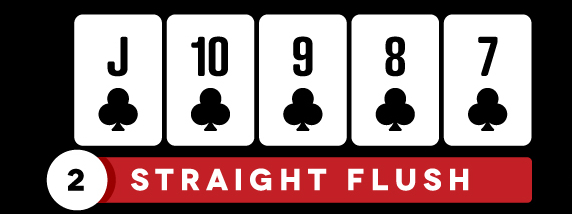
A straight flush is any five-card sequence of cards that are all the same suit. An example would be 8-7-6-5-4 of diamonds. The hand lives up to its name as it essentially combines a straight (a five-card sequence) with a flush (five cards of the same suit). This hand is extremely powerful and it’s rare that it ever gets beaten.
- Other names: None
Four of a Kind
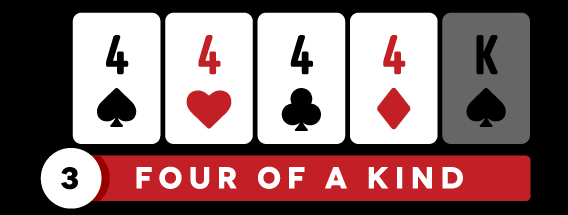
Four cards of the same face value. For instance, four kings or four sevens. Another way of thinking about it is the identical card from each suit. For example the deuce of clubs, deuce of hearts, deuce of diamonds and deuce of spades. Four of a kind is very rarely beaten.
- Other names: Quads
Full House
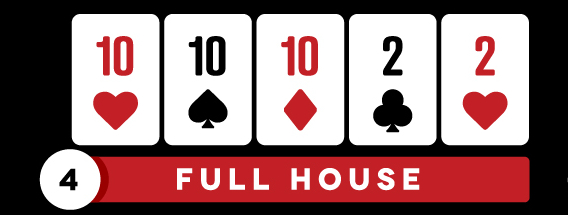
A full house is three of a kind and a pair combined. For example ace-ace-ace-king-king or 3-3-3-8-8. Full houses are extremely strong hands but at least somewhat visible in Texas Hold’em because the board must have at least one pair on it to complete the hand.
- Other names: Boat
Flush
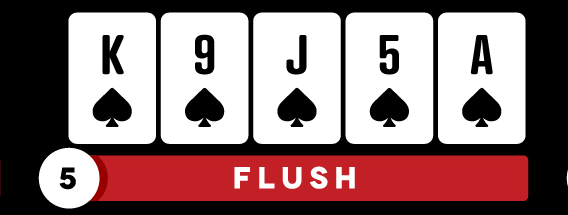
Five cards of the same suit. For instance king-ten-six-five-deuce all of diamonds. The order does not matter but having a high card can be a tiebreaker in flush vs flush situations. Flushes are very strong hands but it’s common for players with flushes to run into opponents who also have flushes (especially if there are four cards of the same suit on the board). In this case you want to have the higher card such as an ace.
- Other names: none
Straight
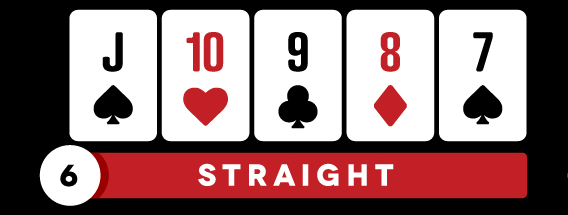
Five cards in a sequence. For example 9-8-7-6-5. Suits do not matter for a straight and you can have as many as you want. One advantage of a straight is that it can be difficult to see on some boards. In situations where it’s straight vs straight, the player with the higher straight wins.
- Other names: The joint, the wheel (if it’s 5-4-3-2-A), broadway (if it’s A-K-Q-J-10).
Three of a Kind
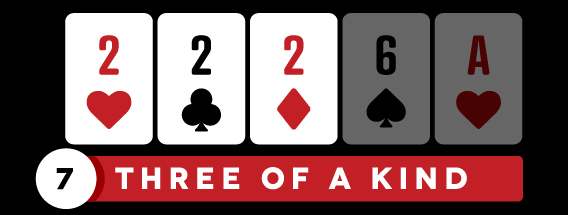
Three of the same face value. For instance king-king-king or five-five-five. Three of a kind can be achieved two ways in Hold’em: 1. Having a pocket pair that hits another card on the board (this is referred to as a “set”). 2. The board pairs and one of your two starting cards hits (this is referred to as “trips”). The former is much more appealing because it’s easier to disguise. If two players have three of a kind, then the player with the higher threesome wins.
- Other names: Set, trips
Two Pair
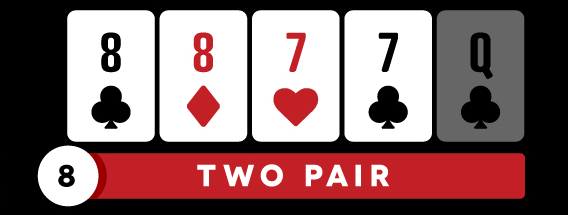
Two pairs of the same face value. For example ace-ace-king-king or 9-9-5-5. If there are two players with two pair, then the player with the bigger pair wins. If the players have the same high pair, then the tiebreaker is the better of the lower pair. Two pair can be a tricky hand because it’s vulnerable to three of a kind and a full house as they share a lot of the same cards on the board.
Other names: Top Two (having the highest possible two pair)
One pair

Two cards of the same face value. For example ace-ace or 2-2. You can make a pair by having both cards in your starting hand or one in your hand and one on the community board in Hold’em. In pair vs pair situations, the higher pair always wins. For instance ace-ace > king-king. In situations where players have the same pair, the tiebreaker comes down to who has the next highest card. If they have the same five-card hand, then the pot is chopped.
- Other names: A pair, pocket pair (if both cards were dealt to the player)
High Card
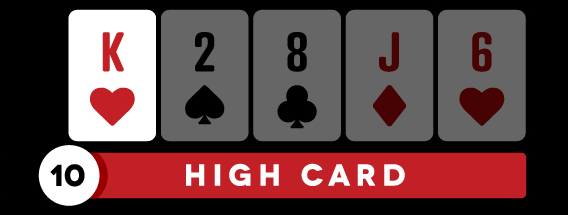
If no players are able to make a hand, then the player with the highest face value card wins the hand. In this situations ace-high is the best possible hand.
- Other names: none
Common Poker Hand Questions
Does a Flush Really Beat a Straight?
Yes. This is one of the most common misconceptions about poker hand rankings. People tend to give more weight to putting together a five-card sequence of numbers than assembling five cards that are all the same suit.
In reality you are significantly more likely to flop a straight over a flush. Keep in mind that straights can be disguised slightly easier than flushes so they do have some extra value in that sense. Quite often players will miss a straight that completes on the river while it’s hard to ignore at least three cards of the same suit.
If you need a quick way of remembering, just think suits>sequences, and that should help.
Should I Ever Fold a Straight Flush or Quads?
Folding a straight flush or quads is almost always a bad play. If you’re a new poker player, you should never, ever fold those hands. Be responsible and just get your money in the middle. Even most seasoned poker pros would never fold those hands unless the board state was truly exceptional.
Make it easy for yourself when you are just starting out and never fold those hands. Some live casinos even award massive bad beat jackpots to players who get those hands cracked in their cash games. So never, ever fold them in those situations.
Do I Have to Use Both My Hole Cards in Texas Hold’em?
No. You must always make the best five-card hand possible and sometimes that will include using just one card from your hand. If you don’t have a qualifying hand, you can even play the board (although in that situation the best you’re going to do is chop the pot with your opponent).
For example, if there’s a board with four diamonds on it and you’re holding the ace of diamonds and the ace of spades then you’d use the ace to make an ace-high flush. The ace of spades would not be utilized in the hand at all.
Do My Extra Cards Matter?
In certain situations, yes.
It’s important to remember when you make a poker hand, you are making your own personal best five-card hand. For instance, if you have ace-king on the river of an ace-ten-four-three-deuce board, then your hand isn’t just a pair of aces. Technically your hand is A-A-K-10-4, which could also be described as top pair, top kicker.
Let’s say your opponent had ace-queen on the same board. They would have A-A-Q-10-4. Because you both have a pair of aces, then you move down to high card. You have a king, which is higher than your opponent’s queen, so you win the hand. If you both had a king, then you would move down to the next highest card.
In general it’s better to have bigger “kicker” cards.
How Common are Royal Flushes?
Extremely rare. The odds of hitting one is approximately one in 31,940 hands. Don’t expect to be hitting a royal flush to beat someone’s straight flush like they often portray in poker movies. There are a number of experienced recreational poker players who have never even seen a royal flush in real life.
Should I Memorize Poker Hand Rankings?
You don’t have to memorize poker hand rankings but it would probably help. You could always download and print out a cheat sheet like the graphic at the top of the article to remember. You can hold off on other poker strategy until you get a firm grasp of poker hand rankings.
Of course there are certain aspects of poker hand rankings that tend to cause more issues than others. Here are the three biggest trouble areas to remember:
- Flushes beat straights
- Three of a kind beats two pair
- Quads beat everything except straight and royal flushes
Does Online Poker Software Display My Hand?
Yes. Modern online poker software shows your current hand. It’s generally a good idea to develop an ability to read a poker board for yourself but it tends to show you what you have in the bottom right corner of the table view.
Play-money poker or micro-stakes poker is a fantastic way to learn the poker hand rankings. The pot is never awarded to the wrong player so you can rest assured that everything was above board.
If it seems like the pot just went to the wrong player, you can always hit the hand re-player and double-check exactly what happened. Quite often the reason falls into one of the following five categories:
- A low straight that completed on the turn or the river
- Two-pair mix-ups. A-A-2-2 beats K-K-Q-Q for instance
- Kicker problems
- A lower flush. Particularly when a player gets there with just one flush card in their hand.
- Three of a kind beats two pair.
What Are the Best Starting Hands in Texas Hold’em?
These are the 10 best starting hands in Texas Hold’em:
- 1. Pocket Aces
- 2. Pocket Kings
- 3. Pocket Queens
- 4. Ace-King Suited
- 5. Pocket Jacks
- 6. Pocket Tens
- 7. Ace-Queen Suited
- 8. Ace-King Offsuit
- 9. Ace-Jack Suited
- 10. King-Queen Suited
Poker Hand Rankings FAQ:
Does a flush beat a straight?
Yes, believe it or not a flush beats a straight. One of the most common misconceptions in regards to poker hand rankings is that poker players tend to give a little more weight in putting together a five-card sequence of numbers than they do putting together five cards that are all the same suit.
Should I fold a straight flush or quads?
No, you should not fold a straight flush or quads. Anytime you fold a straight flush or quads, it’s pretty much always the wrong play. For all of you new poker players out there, you should never, ever fold a straight flush or quads. Even experienced poker players hardly ever fold on these poker hands.
How common are royal flushes?
Royal flushes are not very common. As a matter of fact, royal flushes are extremely rare. Don’t let all those big, blockbuster poker movies fool you. The odds of hitting a royal flush is roughly one in every 649,739 poker hands. Some of the best poker players on the planet have never even seen a royal flush before.
